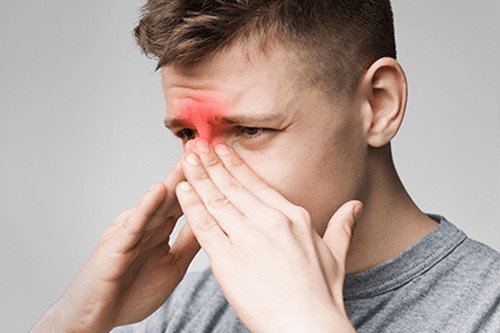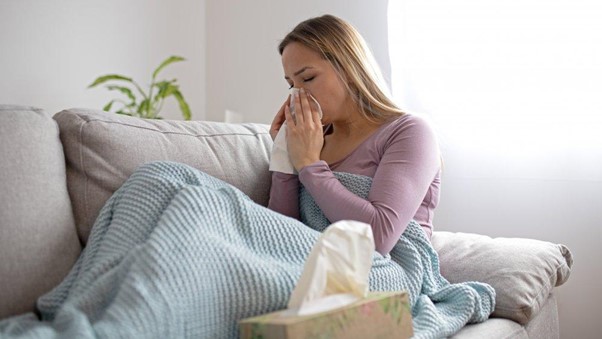
Sinus issues are a common problem that affects millions of people. It can be caused by allergies, colds, viral infections, and even structural problems with the sinuses.
Symptoms can range from mild to severe and include facial pressure or pain, headaches, congestion, postnasal drip, bad breath, coughing, and sneezing.
It is important to know the symptoms, causes, and when to see a doctor for common sinus issues to properly treat and prevent them.
Symptoms of Common Sinus Issues
Nasal Congestion or Blockage
One of the most common symptoms of sinus issues is nasal congestion or a blockage in your nose.
This can make it difficult to breathe through your nose, which can cause discomfort and affect your quality of life.
It can also lead to other symptoms such as postnasal drip, where mucus from your nose drips down the back of your throat and a cough.
Headaches
Headaches are another common symptom of sinus issues. These types of headaches are often described as pressure or tightness in your forehead, cheeks, or temples.
They can be quite severe and can last for several hours or even days. Sometimes the pain can be so severe that it can affect your ability to concentrate or perform daily tasks.
Fatigue
Fatigue is a common symptom of sinus issues that many people don’t realize is related to their sinus problems. When your sinuses are inflamed, your body has to work harder to fight off infection and clear out the mucus.
This can lead to fatigue and a feeling of being run down, even if you’ve been getting enough sleep.
Facial Pain or Pressure
Facial pain or pressure is another common symptom of sinus issues. This typically occurs in the areas around your nose, cheeks, and eyes.
The pain can be intermittent or constant, and it can be quite severe at times. It can also be accompanied by other symptoms such as nasal congestion or headaches.
Bad Breath
Bad breath is a symptom that many people don’t associate with sinus issues, but it can be a sign that there is an infection present in your sinuses.
When your sinuses are infected, bacteria can build up and cause a foul odor in your mouth. This can be embarrassing, and it can also be a sign that you need to seek treatment.
Causes of Common Sinus Issues
Allergies
One of the most common causes of sinus trouble is allergies. Allergies occur when your body reacts to something you inhale, eat, or touch.
Symptoms of allergies include nasal congestion, sneezing, itchy eyes, and a sore throat. Allergies can be triggered by a variety of substances, including pollen, dust, and pet dander, and they can occur year-round or seasonally.
If you think you may have allergies, look for over-the-counter or prescription medications that can help reduce your symptoms.
Infections
Sinus infections occur when bacteria, viruses, or fungi enter the sinuses and cause swelling, inflammation, and mucus buildup. Symptoms of sinus infections often include pain and pressure in the face, a headache, fever, and congestion.

Typically, antibiotics are the primary treatment option for a sinus infection, but your doctor may also suggest over-the-counter pain relievers and decongestants.
Structural Irregularities
Structural irregularities like a deviated septum or a nasal polyp can obstruct the sinus passageways and prevent optimal airflow.
A deviated septum is when the cartilage that separates your nostrils is crooked, while a nasal polyp is a soft, painless growth that develops on the lining of your nose.
When left untreated, these issues can make sinus problems worse, ultimately leading to continued congestion and difficulty breathing. In severe cases, surgery may be recommended.
Environmental factors
The environment can also play a significant role in causing sinus problems. Exposure to pollutants, irritants, and changes in humidity can affect the health of your sinuses.
Indoor pollution can include dust, mold, and pet dander, while outdoor pollution can include cigarette smoke or car exhaust fumes.
If you think your sinus problems may be tied to environmental factors, try reducing your exposure to these triggers, and use air filtration systems or humidifiers.
Lifestyle choices
The choices you make in your daily life can also affect the health of your sinuses.
Smoking, for example, can irritate the lining of your sinuses, leading to inflammation and swelling. Additionally, consuming a diet that is high in sugar, alcohol, and saturated fats can weaken your immune system, making it more difficult for your body to fight off infections.
Making healthier lifestyle choices can play a significant role in improving your sinuses and reducing your chances of developing sinus issues.
When to See a Sinus Doctor for Common Sinus Issues
If the symptoms of common sinus issues persist for more than 10 days or if they are accompanied by fever and facial swelling, it is best to see a sinus specialist singapore doctor. In some cases, further testing may be needed to determine the cause of the sinus issues.
Tips on Treating and Preventing Common Sinus Issues
Treating common sinus issues depends on the cause. Depending on the diagnosis, your doctor may recommend a combination of medications, lifestyle changes, or even surgery.
To prevent common sinus issues, it is important to manage allergies and avoid exposure to irritants such as smoke or pollution.
Additionally, staying hydrated, using a humidifier, and practicing good hygiene habits can help prevent sinus problems.
Conclusion
Common sinus issues can range from mild to severe and may be caused by allergies, colds, viral infections, and structural problems with the nose or sinuses.
Knowing the symptoms, causes, and when to see a doctor for common sinus issues is essential to properly treat and prevent them. With the right medical care, you can get relief from your sinus issues and live your life symptom-free.